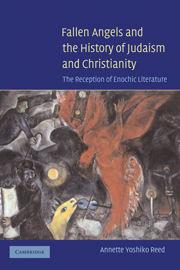Book contents
- Frontmatter
- Contents
- Preface
- List of Abbreviations
- Fallen Angels and the History of Judaism and Christianity
- Introduction
- 1 Angelic Descent and Apocalyptic Epistemology: The Teachings of Enoch and the Fallen Angels in the Book of the Watchers
- 2 From Scribalism to Sectarianism: The Angelic Descent Myth and the Social Settings of Enochic Pseudepigraphy
- 3 Primeval History and the Problem of Evil: Genesis, the Book of the Watchers, and the Fallen Angels in Pre-Rabbinic Judaism
- 4 The Parting of the Ways? Enoch and the Fallen Angels in Rabbinic Judaism and Early Christianity
- 5 Demonology and the Construction of Christian Identity: Approaches to Illicit Angelic Instruction among Proto-Orthodox Christians
- 6 The Interpenetration of Jewish and Christian Traditions: The Exegesis of Genesis and the Marginalization of Enochic Literature
- 7 The Apocalyptic Roots of Merkabah Mysticism? The Reemergence of Enochic Traditions in Rabbinic Judaism
- Epilogue
- Bibliography
- Index of Modern Authors
- Index of Primary Sources
- Subject Index
Introduction
Published online by Cambridge University Press: 17 August 2009
- Frontmatter
- Contents
- Preface
- List of Abbreviations
- Fallen Angels and the History of Judaism and Christianity
- Introduction
- 1 Angelic Descent and Apocalyptic Epistemology: The Teachings of Enoch and the Fallen Angels in the Book of the Watchers
- 2 From Scribalism to Sectarianism: The Angelic Descent Myth and the Social Settings of Enochic Pseudepigraphy
- 3 Primeval History and the Problem of Evil: Genesis, the Book of the Watchers, and the Fallen Angels in Pre-Rabbinic Judaism
- 4 The Parting of the Ways? Enoch and the Fallen Angels in Rabbinic Judaism and Early Christianity
- 5 Demonology and the Construction of Christian Identity: Approaches to Illicit Angelic Instruction among Proto-Orthodox Christians
- 6 The Interpenetration of Jewish and Christian Traditions: The Exegesis of Genesis and the Marginalization of Enochic Literature
- 7 The Apocalyptic Roots of Merkabah Mysticism? The Reemergence of Enochic Traditions in Rabbinic Judaism
- Epilogue
- Bibliography
- Index of Modern Authors
- Index of Primary Sources
- Subject Index
Summary
THE BOOK OF GENESIS TELLS US PRECIOUS LITTLE ABOUT THE FIGURE of Enoch. In the course of presenting a genealogical list of those who lived before the Flood, it notes his Sethian ancestry via Jared (5:19) and his fathering of Methusaleh (5:21). We find only hints of his special status: the other men in the genealogy merely live, propagate, and die, but Genesis states twice that Enoch “walked with God” (5:22, 24). And rather than tell his death in straightforward terms, it recounts that “he was no more, for God took him” (5:24).
The brevity of the biblical comments stands in stark contrast with the wealth of traditions about Enoch in Judaism and Christianity. As early as the Second Temple period (536 bce to 70 ce), Enoch attracts intensive interest within Judaism. He becomes a scribe, sage, and even scientist. As visionary, he is taken up to heaven and travels with angels to the ends of earth. As witness and prophet, he exhorts against sin, predicts Israel's history, and even intercedes for wicked angels. Moreover, books begin to circulate under his name, purporting to record the visions and teachings that the antediluvian patriarch passed on to his progeny and bequeathed to the righteous of future generations.
The present study tells the story of one of the earliest and most influential of these books, namely, the Book of the Watchers.
- Type
- Chapter
- Information
- Fallen Angels and the History of Judaism and ChristianityThe Reception of Enochic Literature, pp. 1 - 23Publisher: Cambridge University PressPrint publication year: 2005

